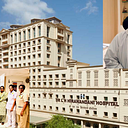How To Prevent Kidney Stones?
There are many factors that contribute to the formation of kidney stones. Some of these factors include diet, dehydration, and certain medical conditions. Although there is no sure way to prevent kidney stones from forming, there are some steps that may help reduce your risk.
However, the best approach depends on your individual situation. If you have a history of kidney stones, your doctor may recommend a specific diet and lifestyle changes.
How To Avoid Kidney Stones?
As per the expert doctors of Hiranandani hospital a kidney treatment hospital, there are several things that you can do to prevent kidney stones from forming. Drink plenty of fluids, especially water, to keep your urine diluted and prevent crystals from forming. Eat a healthy diet that includes plenty of fruits, vegetables, and whole grains, and limit salt and animal protein. Avoid crash diets and fad diets that can lead to dehydration and increase your risk of kidney stones.
If you have a family history of kidney stones, or if you have had kidney stones in the past, you may be at increased risk for developing them again. Talk to your doctor about ways to reduce your risk, such as taking certain medications or supplements.
If you think you may have a kidney stone, make an appointment to see your doctor. They can confirm the diagnosis and recommend the best treatment for you.
How to keep your kidneys healthy?
As much as we hate to admit it, our kidneys play a vital role in our overall health and well-being. That’s why it’s important to keep them healthy and free from stones.
Here are some tips to keep your kidneys healthy and prevent kidney stones:
Drink plenty of fluids
This is one of the most important things you can do for your kidneys. Drinking enough fluids helps to keep your urine diluted and prevent crystals from forming. Aim for at least eight glasses of water a day.
Eat a healthy diet
Eating a diet that is low in salt, animal protein, and sugar can help to prevent kidney stones. Be sure to include plenty of fruits, vegetables, and whole grains in your diet.
Get regular exercise
Exercise helps to keep your body healthy and can also prevent kidney stones. Aim for at least 30 minutes of moderate exercise most days of the week.
Limit your intake of salt
Too much salt can increase your risk of developing kidney stones. Try to limit your daily salt intake to 2,300 milligrams or less.
Avoid dehydration
Dehydration is a major risk factor for kidney stones. Be sure to drink plenty of fluids during hot weather or when you are exercising.
Limit your intake of animal protein
Eating too much animal protein can increase your risk of developing kidney stones. Try to limit your daily intake to no more than six ounces.
Avoid crash diets
Crash diets can lead to dehydration and can also increase your risk of developing kidney stones.
Drink plenty of fluids during pregnancy
Pregnant women are at increased risk of developing kidney stones. Be sure to drink plenty of fluids to stay hydrated.
Avoid using supplements
Certain supplements, such as vitamin C, can increase your risk of developing kidney stones. If you take supplements, be sure to talk to your doctor first.
Talk to your doctor
If you have a family history of kidney stones, you may be at increased risk of developing them. Be sure to talk to your doctor about your risk factors and what you can do to prevent kidney stones.
How to tell if you’re at risk for kidney stones?
If you have kidney stones, you may be at risk for kidney disease. Kidney stones can block the flow of urine and cause kidney damage. Kidney stones are more common in men than women. People who are obese, have high blood pressure, or have a family history of kidney stones are at increased risk for kidney stones.
If you’re at risk for kidney stones, you may have kidney disease. Symptoms of kidney disease include:
· Pain in your side or back
· Problems urinating
· Swelling in your ankles, feet, or legs
· Fatigue
· Nausea
· Skin rash
If you have any of these symptoms, see a doctor. You may be at risk for kidney stones if you have a family history of kidney stones, are overweight, or have diabetes.
How to treat kidney stones?
If you have kidney stones, you may not need to treat them right away. But if they cause pain or other problems, there are a number of ways to get rid of them.
Hiranandani Hospital uses the latest technology and techniques to treat kidney stones. The team of experts, led by Dr. Sujit Chatterjee CEO Hiranandani hospital, works to develop a treatment plan that’s right for you.
There are several ways to treat kidney stones, including:
· Surgery: This best kidney hospital in Mumbai offers a variety of surgical options to treat kidney stones, including minimally invasive surgery.
· Shock wave lithotripsy: This procedure uses sound waves to break up kidney stones so they can be passed through your urinary system.
· Ureteroscopy: This procedure uses a small scope to remove kidney stones from your urinary tract.
· Medication: The expert doctors prescribes the medication to help dissolve kidney stones or help prevent new ones from forming.
If you have kidney stones, the team at Hiranandani Hospital can help you find the best treatment option for you. Contact us today to learn more.
Conclusion
The best way to prevent kidney stones is to drink plenty of fluids, eat a healthy diet, and avoid crash diets. If you have a family history of kidney stones, you may be at a higher risk for developing them. Talk to your doctor about your risk factors and what you can do to prevent kidney stones from forming.
